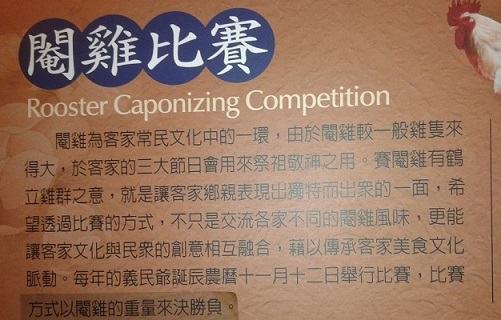Rooster Caponizing Competition
« previous post | next post »
Sign at the Hakka Cultural Museum in Kaohsiung, Taiwan:
From David Deterding's blog, "Language in Brunei": "Caponizing" (1/1/16)
yānjī bǐsài 閹雞比賽 ("capon contest / competition")
OR
yān jī bǐsài 閹雞比賽 ("caponizing contest / competition")
This website about festivals and events in Hualian, Taiwan refers to a " rooster-castrating contest" that is part of the Hakka Carnival series there.
Here is the English abstract of a twenty-page research paper titled "An Investigation of Hakka Caponization Technique in Liudui Area":
Capon is part of the Hakka ritual culture which is belonging to the common memories for the older generation of Hakka people. Cockerels are raised to 4-8 weeks, and then the surgery of caponization is conducted. The capon in Hakka worship to pray, worship ceremony of reverence for his ancestors, which can highlight the Hakka stamina religious meaning in terms of spirit of diligence and hard-working. Therefore, capon worship plays an important role in the Hakka ritual culture. The surgical caponization technique can only be pass on to relatives in early rural Hakka society. The practicing capon masters were less than 200 people now. Therefore, the government held a capon training course hoping to preserve the caponization technique in 1990s. The purpose of this study is to investigate the surgical caponization technique in qualitative method by observation and semi-structured interviews. Additionally, this study revealed the surgical caponization technique in more details in order to make a progress and innovation for the technology. Moreover, experiments for the cockerel care after surgery … were carried out. Furthermore, in order to examine the feasibility of capon industry, this study also assessed the capon chefs decreasing and capon technique disappearing. Some suggestions regarding to the development of caponization technique and capon industry were also provided.
On the 15th day of the first lunar month each year, a capon competition is held in Liudui, which is in Pingtung County, Taiwan).
There's a question of what actually goes on in such contests:
1. competing with living capons
2. competing with dead / cooked capons
3. displaying caponization / castration skills / techniques
Judging from this large set of Google images for 閹雞比賽, such Hakka contests may compete with live capons, cooked / dead capons, and with caponization techniques.
But then the question arises of how to parse and pronounce 閹雞. Is it yānjī or yān jī? I would parse the Chinese word for "capon" as yānjī and the expression for "caponize [a rooster / cockerel]" as yān jī. I would pronounce "yānjī" and "yān jī" differently, the latter with a very slight pause between the two syllables and a teeny bit more emphasis on the second syllable, though still squarely a first tone.

Dan Lufkin said,
January 15, 2016 @ 9:19 pm
I suppose the cockerels have their own topolect word for the procedure.
Natalie Solent said,
January 16, 2016 @ 6:53 am
Not just the roosters. I had to check what "decaponization" was in the vulgar tongue.
Rodger C said,
January 16, 2016 @ 11:50 am
It'd be rather pointless to castrate a dead rooster, since the point is to create a docile creature with tender flesh.
Victor Mair said,
January 16, 2016 @ 2:52 pm
@Rodger C
That's definitely not one of the options for these contests.
David Deterding said,
January 16, 2016 @ 9:22 pm
@ Natalie Solent : Not just the roosters. I had to check what "decaponization" was in the vulgar tongue.
As you suggest, the term 'caponize' is somewhat obscure, and as I discussed in the original post, it seems a bit strange to use an obscure term like that in a translation, the purpose of which is presumably to explain something clearly to non-Chinese speakers.
However, in a funny sort of way, 'caponize' may be quite accurate. The Chinese character 閹 is not very common, and the English translation is equally obscure. I asked my wife, who is from Taiwan, what 閹 means, and she didn't know; so it seems kind of appropriate if non-Chinese people can't understand the translation!
Victor Mair said,
January 18, 2016 @ 8:04 am
From Sophie Ling-chia Wei:
These roosters were emasculated since the time they were cockerels. After being emasculated, these roosters were fed as much as possible to grow as big as possible. Then the heaviest and the biggest one will win the contest. The winning rooster will be killed and sacrificed to worship Heaven. The detailed information could be seen on this web site.